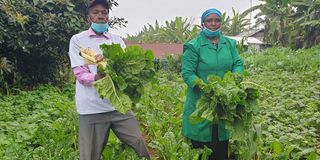Murang’a couple reaps big from organic agriculture

John Karanja and his wife Esther Nyambura harvesting spinach which they grow using organic agriculture.
What you need to know:
- Every week, Esther sells vegetables worth about Sh6,000 from her half-acre farm.
- They do not shy away from informing their clients that they opt for organic agriculture.
- To sustain the market, the couple plants a new crop every two weeks.
- OACK trains farmers on the need to use locally available materials to make compost manure and organic pesticides.
On a chilly morning in Kangari, Murang’a County, a couple is busy harvesting vegetables.
It is on a Friday, one of the days that John Karanja and his wife Esther Nyambura harvest their vegetables for marketing.
Amidst their work, Esther’s phone keeps ringing. Her clients are calling, enquiring what time she will arrive at the nearby Kangari market for deliveries. She failed to take vegetables to the market on Tuesday as they anticipated, prompting some of them to keep calling for double supply.
Every week, Esther sells vegetables worth about Sh6,000 from her half-acre farm. However, the earnings are slightly lower currently, as the heavy rains that pounded the area recently caused an increase in production.
This couple has gone against the odds to grow their vegetables organically.
They do not shy away from informing their clients that they opt for organic agriculture. This is also a way of marketing their produce, especially at a time when many people are avoiding chemical-laced foods, mostly fresh produce.
Esther does not recall exactly when she decided to practice organic agriculture.
“It was when my daughter was about five years old, and she is now working,” she remembers.
The couple grows various vegetables including kale (sukumawiki), spinach, amaranth and black night shade carrots among others.

OACK Extension Officer Duncan Ndirangu (right) explains how to make g organic manure.
Constant supply
To sustain the market, the couple plants a new crop every two weeks. This, she says, ensures there is supply throughout the year.
Besides, she also grows maize and beans organically.
Making the compost manure for the crops is a journey that they consider interesting, sometime a little demanding yet rewarding.
Karanja explains that they dry vegetation like Napier grass, maize stalks, weeds and tree branches then make a heap from it.
The heap is then covered with wood ash then topped with soil.
Some manure from their dairy cows is then added to this heap before covering it again with more soil, wood ash and manure.
This content is then covered with some fresh banana leaves and left for 21 days before turning it over.
However, within the 21 days, the farmer uses a dip stick to poke deep into the heap to check if it is processing going on well.
“The stick should feel warm on touching. If the stick is cold, then the manure is either ready or something has gone amiss,” explains Karanja.
The mixture should be turned once every 21 days and is ready for use after 63 days.

Karanja harvesting sukumawiki at his farm in Kangari, Murang'a County.
Sustainable agriculture
This is a technique which this couple learnt through the Organic Agriculture Centre of Kenya (OACK), a non-governmental organisation which promotes sustainable agriculture and livelihoods for small scale farmers.
The organisation’s Extension Officer Duncan Ndirangu says they work with over 1,000 small scale farmers annually, with a total reach of over 10,000 farmers.
OACK, he adds, trains farmers on the need to use locally available materials to make compost manure and organic pesticides.
Plants like tithonia, Mexican marigold and pepper are used to make organic pesticides. This saves the farmer the cost of agrochemicals and the consumer the risk of consuming harmful chemicals.
“We also work to improve diversity in farming so that farmers do not only depend on traditional tea and coffee crops but can have other agricultural ventures to increase income,” says Ndirangu.
According to experts, organic farming comes with numerous advantages as it is not only beneficial to the environment and farmers but to the consumer as well.
Rosinah Mbenya, the programmes officer at Participatory Ecological Land Use Management (Pelum) Kenya, says organic farming prevents rivers, for example, from being polluted with a flow of agrochemicals.
Pelum is an umbrella organisation for grassroots organisations which promote ecological agriculture and sustainable land use which conserves the environment. Currently, the organisation has 52 members spread across 42 counties.
In 2011, Rosina notes, the Africa Union (AU) passed policies which support ecological organic agriculture. She urges Kenya to adopt organic agriculture for a healthier, wealthier citizenry.
Mary Irungu, the advocacy and communications officer at Pelum Kenya, is urging the government to adopt policies which support organic agriculture.
“The government should also allocate a budget to promote organic agriculture so that more farmers are reached out with the message to embrace it,” she says.
Farmers, she adds, should not only focus on making money from agriculture, but they should be mindful of the consumer, who include their own families, and grow healthy crops.





